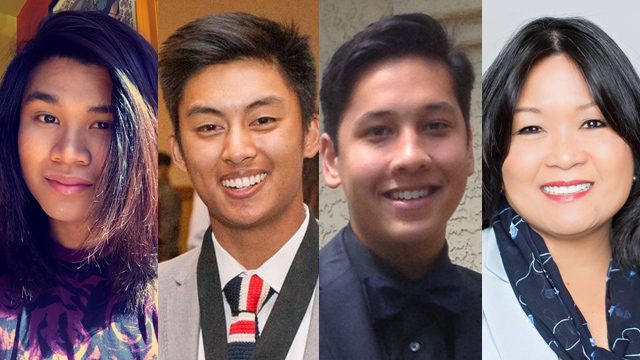SUMMARY
This is AI generated summarization, which may have errors. For context, always refer to the full article.

CALIFORNIA, USA – What would Mario Savio say?
The voice of the Free Speech Movement (FSM) in this country would have served up a mouthful about recent events at University of California at Berkeley, where on December 2, 1964, the then-philosophy major delivered his impassioned call to action for racial equality at Sproul Hall, birthing the Free Speech Movement.
Back then, Savio urged fellow students to “put your bodies on the gears” and disarm the political establishment.
Had a heart attack not silenced him at age 53 in 1996, Savio surely would have words about the aborted visits to his alma mater by conservative commentators.
“Cal,” as locals refer to the school, is either emulating or betraying the Baby Boomer champions of civil rights, goes the debate on assorted media platforms.
The issue of free speech rages anew amid recent events, such as President Donald Trump dismissing criticism of his administration as “fake news,” the Federal Communications Commission reviewing TV host Stephen Colbert for making a vulgar joke against the president, and the conviction of 3 Code Pink activists for protesting the confirmation of then-nominee for Attorney General Jeff Sessions.
Berkeley may be the bastion of progressive thought, but it draws folks of every political leaning. And Filipino Americans agree that FSM is alive and well from where it sprung.
“I don’t think the free speech movement is dead at Cal,” said Cagayan de Oro-born Jacob Sese, a 19-year-old molecular cell biology freshman.
“I think there’s a disagreement on what is considered hate speech, and many people here don’t tolerate hate speech. The violence and threats of it in no way represent the desires of the university or the student body, and great efforts have been made by students to make that clear,” Sese said.
22-year-old media studies junior Robin Cid Calleja, who was raised in Las Piñas in Manila, sees the same picture.
“Sproul continues to be a bustling plaza where students can engage in social, cultural, and political activities. It continues to be the heart of student activities, where various student groups – including racial minorities, like Filipino students who make up barely 2% of the student population – can have their identities represented and where political minorities on campus, such as the Berkeley College Republicans, can express their ideas and opinions. I think that shows that the Free Speech Movement’s legacy lives on,” he said.
For Calleja, those lamenting the death of free speech in Berkeley are unaware of the spirit of the movement.
“They need to understand that while free speech protects people from state- or university-sanctioned censorship or retaliation, it does not protect them from being ridiculed by their peers. Peaceful protests and harsh criticisms from liberal students are not indications that the Free Speech Movement is dead. Rather, these are (acts of) free speech at work,” Calleja said.
While New Jersey-born Justin Lagera agrees with his schoolmates, he stressed that the Free Speech Movement has taken on a different character than it did during its inception in the 1960s.
“To me, the biggest debate is whether or not the political correctness culture has become too invasive. There’s a big gray area as to what constitutes protected free speech or what determines unprotected speech and that fogginess sparks competition between differing parties,” the political studies freshman said.
Cancelled visits, echo chambers
The question on free speech was also prompted by the violence that cancelled the February 1 campus visit of alt-right Milo Yiannopoulos, former editor at Breitbart News, who last year was permanently banned by Twitter for allegedly “inciting and engaging in harassment.”
Over 100 Cal faculty had signed a petition calling for the cancellation of the Berkeley College Republicans engagement before a thousand protesters assembled at the event site. Violence erupted when mask-wearing individuals descended on campus.
The university averted a potential conflict with the cancellation of a planned speech by right-wing advocate Ann Coulter scheduled for April 27. Berkeley police recommended postponing Coulter’s visit, which Coulter rejected. This later fueled contradicting versions on why her speech did not happen.
The fate of her speech does not signal the death of free speech, Calleja said, but simply the lack of coordination between event sponsors and the university.
Opposing views
Licensed marriage and family therapist Nan Santiago, a Democrat, attested to the fundamental identity of the campus and the Free Speech Movement.
“I was there in 1981, so the internet and electronic media were not as available as now. Everything can be posted instantly today, whereas before it took longer to gather people and to spread the words to the community,” she said.
“UC has been very liberal with free speech, lots of demonstrations, diverse students and all ages…I recall when I was there, even the teens not (enrolled) hung out there since Berkeley city itself did not have the same curfew hour for teens as the neighboring cities,” she recalled.
Corin Ramos also expressed admiration for her alma mater’s “history of student movements.”
“Students are not afraid to voice their opinions. In fact, it was encouraged. So many different viewpoints to learn from. Without fear or retaliation for thinking differently,” said the mass communications graduate.
“I vehemently disagree with Ann Coulter’s hateful rhetoric and others like her. But, I support her right to free speech just as much as I support those who speak out against reprehensible intolerance,” she added.
Calleja, a future journalist, said he is open to hearing opposing views.
“I’d like to know where they are coming from, and possibly find common ground. That’s the whole point of having free speech – to have a marketplace of ideas where people can choose to support the ones that speak to their values and reason or to come up with their own,” he said.
He may still have the opportunity to hear Yiannopoulos, who has vowed to initiate “Free Speech Week” before the year ends in Berkeley. – Rappler.com
Add a comment
How does this make you feel?



![[Ilonggo Notes] The foremost Filipino engraver, sadly unremembered, needs to be given his due](https://www.rappler.com/tachyon/2024/03/Figueroa-.jpg?resize=257%2C257&crop=265px%2C0px%2C720px%2C720px)

There are no comments yet. Add your comment to start the conversation.